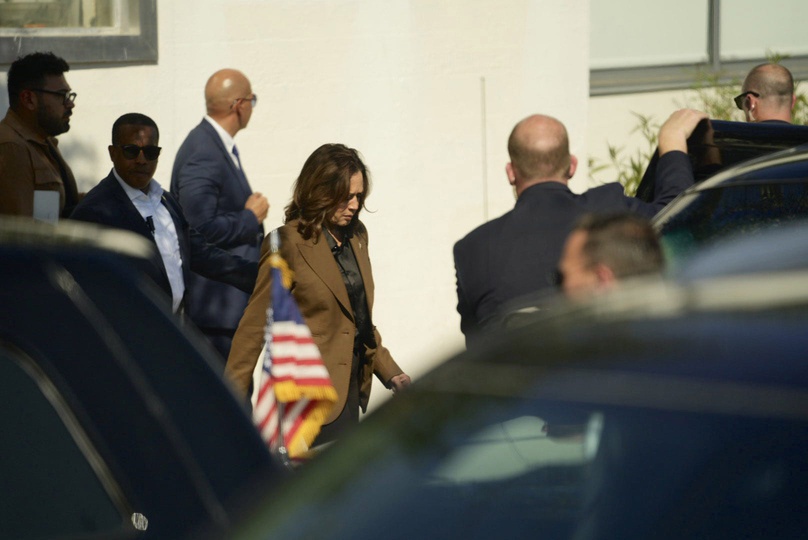Kamala Harris’s recent attempt to boost her presidential campaign has become a public relations nightmare, leaving top Democrats scrambling and even President Biden subtly undermining her. Harris’s whirlwind media tour launched with an unexpected appearance on Call Her Daddy, a podcast known for its provocative discussions. It was a puzzling choice that instantly raised questions about her campaign strategy. Why, many wondered, would Harris choose a podcast associated more with edgy celebrity gossip than political discourse to showcase her leadership and appeal? The decision raised eyebrows within the party and among voters, casting doubt on Harris’s sense of judgment and the competence of her campaign team.
From there, the media blitz only escalated in strangeness. Harris avoided substantive interviews with any potentially challenging outlets, opting instead for safe spaces like The View and 60 Minutes. Her message remained vague and filled with platitudes, offering little insight into her plans for the economy, immigration, or the mounting Middle East tensions. In nearly every appearance, she leaned on feel-good generalities about the “dreams and ambitions” of the American people, leaving voters with no concrete sense of her vision or policies. This hesitancy to engage in tough conversations only fueled skepticism, as viewers noticed the absence of clarity or hard-hitting substance.
The question of Harris’s readiness took on a more personal dimension as her husband, Doug Emhoff, faced renewed scrutiny. Allegations of past misconduct—including an accusation that he struck an ex-girlfriend—were left conspicuously unaddressed in her media rounds. Notably, on 60 Minutes, Harris’s interviewer steered clear of pressing her on Emhoff’s past, despite the program’s history of uncompromising journalism. This glaring omission reinforced the perception of Harris as a candidate protected by the liberal media and unwilling to confront difficult questions—a stark contrast to the scrutiny often aimed at other candidates.
As Harris’s campaign fumbled, even President Biden appeared reluctant to stand by her. In the midst of Hurricane Milton, Harris’s response seemed to highlight her disconnect with critical issues. She urged Floridians to heed local officials, yet failed to communicate concrete details or a plan for federal aid, even as millions faced evacuation. When she tried to reach out to Florida Governor Ron DeSantis, her attempts at coordination reportedly went unanswered, leading her to criticize him for “playing politics.” However, DeSantis pushed back, asserting that Harris had never called during any previous hurricane response efforts under the Biden administration, pointing out the political undertones of her sudden outreach.
The situation intensified when President Biden held a surprise press conference, during which he conspicuously praised DeSantis’s cooperation, subtly distancing himself from Harris’s claims. “All I can tell you is I’ve talked to Gov. DeSantis,” Biden said. “He’s been very gracious. He knows what we’re doing, and I think that’s important.” Biden’s comments underscored the apparent rift between him and Harris, a sentiment reportedly shared by some high-ranking Democrats. According to insiders, many within the party are anxious, with veteran strategist James Carville openly admitting he is “scared to death” about Harris’s prospects and the impact on the Democratic ticket.
One by one, Harris’s attempts to rally support fell flat. On The View, co-hosts like Ana Navarro and Sunny Hostin, both known for their liberal leanings, couldn’t contain their admiration, praising Harris as if she were a hero returned from battle. Their enthusiastic welcome, however, did little to shift the perception of Harris’s campaign as one propped up by sympathetic media. Even Howard Stern, who once prided himself on his fearless questioning, fawned over Harris, avoiding the more serious issues while making his personal disdain for Trump known. “I’m really nervous because I want this to go well for you,” Stern confessed, seeming more concerned with protecting her image than conducting a meaningful interview.
This cycle of carefully managed appearances has highlighted the absence of transparency in Harris’s campaign. Her inability to present specific policy ideas, coupled with a resistance to engage with skeptical interviewers, has drawn frustration from her own party. Long-time supporters and strategists who had once been hopeful about Harris are now voicing concern that her campaign could be more of a liability than an asset. Even Obama, a stalwart in the Democratic party, has reportedly expressed his reservations, maintaining a notable distance as Harris’s struggles continue.
The final leg of Harris’s media spree took her to 60 Minutes, where her prepared, often scripted answers seemed to falter under scrutiny. In a segment discussing foreign policy, Harris attempted to attribute regional shifts in the Middle East to the Biden-Harris administration’s advocacy efforts. Yet her answer was so muddled that 60 Minutes opted to edit it out. The decision drew backlash, with former CBS staffers calling for transparency. It underscored the inconsistency between Harris’s messaging and the reality of the administration’s diplomatic challenges, raising concerns about the readiness of Harris for the White House.
In a race against time with only a month left until Election Day, the Democrats face an unprecedented crisis of confidence in Harris’s ability to appeal to a wider electorate. Her media blitz—intended to boost her image and draw in undecided voters—has instead exposed a lack of substance that even her allies can’t ignore. Democrats, scrambling to unite a fractured party, are left wondering if Harris’s campaign will survive the final stretch or if the GOP will capitalize on the chaos.
In this high-stakes race, Harris’s media tour may have backfired to a degree that Democrats never anticipated. While the liberal media continues to rally around her, the question of her readiness remains unanswered, casting an ominous shadow over her chances come November.












